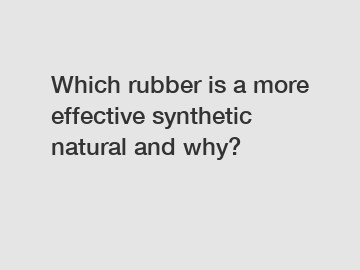Which rubber is a more effective synthetic natural and why?
Apr. 07, 2024
Rubber is a versatile material that is used in a wide range of applications, from tires to hoses to gloves. There are two main types of rubber: synthetic rubber, which is made from chemical compounds, and natural rubber, which is derived from the sap of rubber trees. Both types of rubber have their own advantages and disadvantages, but which is more effective overall?
Natural Rubber vs. Synthetic Rubber.
Natural rubber has been used for centuries, dating back to the ancient civilizations of the Americas. It is derived from the sap of the Hevea brasiliensis tree, which is native to the Amazon rainforest. Natural rubber is known for its elasticity, resilience, and durability, making it an ideal material for a wide range of applications. However, natural rubber can be prone to degradation over time, especially in the presence of heat, light, and chemicals.

On the other hand, synthetic rubber is made from petroleum-based chemicals and is manufactured through a process of polymerization. Synthetic rubber was developed as a substitute for natural rubber during World War II when supplies of natural rubber were limited. Synthetic rubber can be customized to have specific properties, such as increased resistance to heat, chemicals, and wear. However, synthetic rubber can be less elastic and resilient compared to natural rubber.
Effectiveness of Natural Rubber.
Natural rubber is often preferred for applications where elasticity and resilience are key, such as in tires, seals, and conveyor belts. Natural rubber has excellent tensile strength and tear resistance, making it a durable material that can withstand repeated stress and strain. Additionally, natural rubber has good abrasion resistance, making it suitable for applications where wear and tear are common.
One of the key advantages of natural rubber is its biodegradability. Unlike synthetic rubber, which is derived from non-renewable resources, natural rubber is a renewable and sustainable material. As such, natural rubber has a lower environmental impact compared to synthetic rubber, making it a more environmentally friendly choice for certain applications.
Effectiveness of Synthetic Rubber.
Synthetic rubber is often preferred for applications where resistance to heat, chemicals, and wear is important, such as in gaskets, hoses, and O-rings. Synthetic rubber can be formulated to have specific properties, such as high heat resistance or oil resistance, making it a versatile material that can be tailored to meet specific requirements. Additionally, synthetic rubber is often more cost-effective than natural rubber, making it a more economical choice for large-scale production.
Despite its advantages, synthetic rubber can have disadvantages compared to natural rubber. Synthetic rubber is typically less elastic and resilient than natural rubber, making it less suitable for applications where flexibility and durability are critical. Additionally, synthetic rubber is not biodegradable and is derived from non-renewable resources, leading to a higher environmental impact compared to natural rubber.
Conclusion.
In conclusion, both natural rubber and synthetic rubber have their own advantages and disadvantages, making them suitable for different applications. Natural rubber is preferred for applications where elasticity, resilience, and biodegradability are important, while synthetic rubber is favored for applications where resistance to heat, chemicals, and wear is critical. Ultimately, the choice between natural rubber and synthetic rubber depends on the specific requirements of the application in question.
Contact us if you have any questions or need more information about the effectiveness of natural rubber vs. synthetic rubber.
Contact us to discuss your requirements of rubber shelf life standard, Fkm Rubber Compound China Supplier, nitrile vs fkm. Our experienced sales team can help you identify the options that best suit your needs.
200
0
0


Comments
All Comments (0)